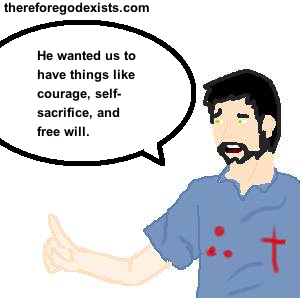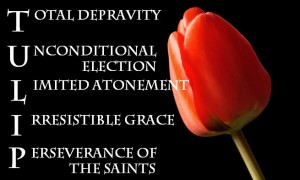 Does free will solve the problem of evil? Burdened by the issue of the evil in the world, many Christians will turn to free will. God allows men to make immoral decisions, even when it brings about suffering, because he wanted us to have free will. He wanted us to turn to him freely in love, and in general, he just wanted us to have the gift of libertarian freedom as we inhabit the earth. But since men are free to choose either good or evil, some will inevitably choose to do evil. Thus, evil prevails, and it is permitted for the sake of free will, which is a greater good. This raises the question: does free will solve the problem of evil?
Does free will solve the problem of evil? Burdened by the issue of the evil in the world, many Christians will turn to free will. God allows men to make immoral decisions, even when it brings about suffering, because he wanted us to have free will. He wanted us to turn to him freely in love, and in general, he just wanted us to have the gift of libertarian freedom as we inhabit the earth. But since men are free to choose either good or evil, some will inevitably choose to do evil. Thus, evil prevails, and it is permitted for the sake of free will, which is a greater good. This raises the question: does free will solve the problem of evil?
Most Christians unthinkingly and blissfully accept the free will theodicy. It has been quite thoroughly propagated among virtually all Christians, save for perhaps Calvinists (who deny that there is free will in a libertarian sense, an issue that this essay will touch on). But with a propagation on such a massive scale, a good among of criticism is chauffeured with it. Ex-Christians already know what to say in response to the challenge of free will. So is it valid? Does free will solve the problem of evil?
Is there free will in Heaven? This problem arises with one of the renderings of the free will theodicy. On this particular version, it is not only that God wants us to have and experience free will, but further, God wants us to have the freedom to choose him over and against evil. This is because he does not want people to turn to him robotically, automatically. He wants people to choose him freely. In fact, love necessitates freedom. There could be no love without freedom. But, the skeptic asks, is there love in Heaven? If so, would that mean that there is free will in Heaven? If so, that would imply that there was evil in Heaven, thus rendering it just as fallen as earth.
I think that this version of the free will theodicy collapses at this. However, the apologist may reply, God wants men to have free will, not because it is a prerequisite of love, but because it is a gift in and of itself. There are certain goods in this world that we could not have in Heaven. We would be so consumed by God’s presence in Heaven that we could not rebel and could not sin. He would literally overpower us. Therefore, there could be no free will in Heaven. Therefore, free will is only for earth. The same could be said of courage and self-sacrifice. These good things could not exist in Heaven. Does free will solve the problem of evil? I think so. God allows evil on earth because he wants us to have courage, and self-sacrifice, and freedom of the will.
Is the free will theodicy available to the Calvinist? A Calvinist is one who believes that God has decided who will be saved from eternity on the basis of the good counsel of his will. The elect will be saved, and the non-elect will be damned. A person is only saved if God draws them to be saved. Jesus only died for the elect. Of course, if this is the case, then a person could not freely choose to be saved. God draws them and they have no choice but to respond to his saving grace. God overpowers their will. So then, could a Calvinist say that God allows evil for the sake of free will?
Does free will solve the problem of evil? Even for the Calvinist? I think so. Recall what I had to say in the last section. The Calvinist can believe in freedom of the will, even for every decision that a person makes, except for salvation. The Calvinist can believe in libertarian freedom, so long as that libertarian freedom does not extend to the decision of salvation. With that in mind, free will may still be one cause of evil and suffering in the world. God could still want to offer humans the gift of freedom, even if he does not extend it to salvific decisions. Calvinists, then, are welcome to apply this theodicy.
What about natural disasters and brain tumors? It often occurs to people that freedom of the will is not really an all-inclusive theodicy. It does not solve every issue. God could allow men to have free will, and still, there would not have to be natural disasters. Natural disasters probably do not follow as a direct consequence of freedom of the will. But even if that is true, the application of the free will response still perseveres. Moral evil (the evil decisions of men) could be accounted for with free will, even if natural evil (disaster, brain tumors, et cetera) has a different solution.
But, does free will solve the problem of evil? Even natural evil? I think that it does. The reason that there is natural evil is precisely because of sin. God created a universe that was custom-made for fallen creatures. It is a fallen world for fallen creatures. Everywhere we turn, we are reminded of our sin and our depravity and our need for God. Everything that we touch screams, “Fallen.” That is why God told Adam, “the ground is cursed because of you.” (Genesis 3:17). So I think that the problem of moral evil and natural evil can find their resolution in freedom of the will.
The free-will theodicy is quite brilliant. I think that we are pretty immune to it because we have heard it so much. But it is a brilliant philosophical point. God wanted us to have good things in this world that we could not have if there was no evil. However, it should also be pointed out that it is not the Bible’s response to evil. It may still be true, but it is established strictly on philosophical grounds.
A central book in the Bible on the problem of evil is the book of Job. Job endures struggle and comes to question God and to assert his own righteousness. Think of Job’s sin like this. Imagine that you had the most beautiful carpet in the world, and it is flipped over. Your friend approaches and can only see the underside of the rug, and they complain, “I thought you said that this rug was beautiful.” You will tell them that because of their limited perspective, they say this. But when the rug flips over, they will see. In exactly the same way, when the rug of this world flips over, we will understand. The question is whether we want to put our trust in the Rugmaker, or question every single thread. Job’s sin was that he multiplied words against God. God is more righteous and loving than we are and he did not put his trust in him. Thus God says, “Who is this that darkens counsel by words without knowledge?” (Job 38:2). Does free will solve the problem of evil? Yes. But it is not the Bible’s answer.
If you would like to get in on the discussion about this, join my Theology Discussion Group!
